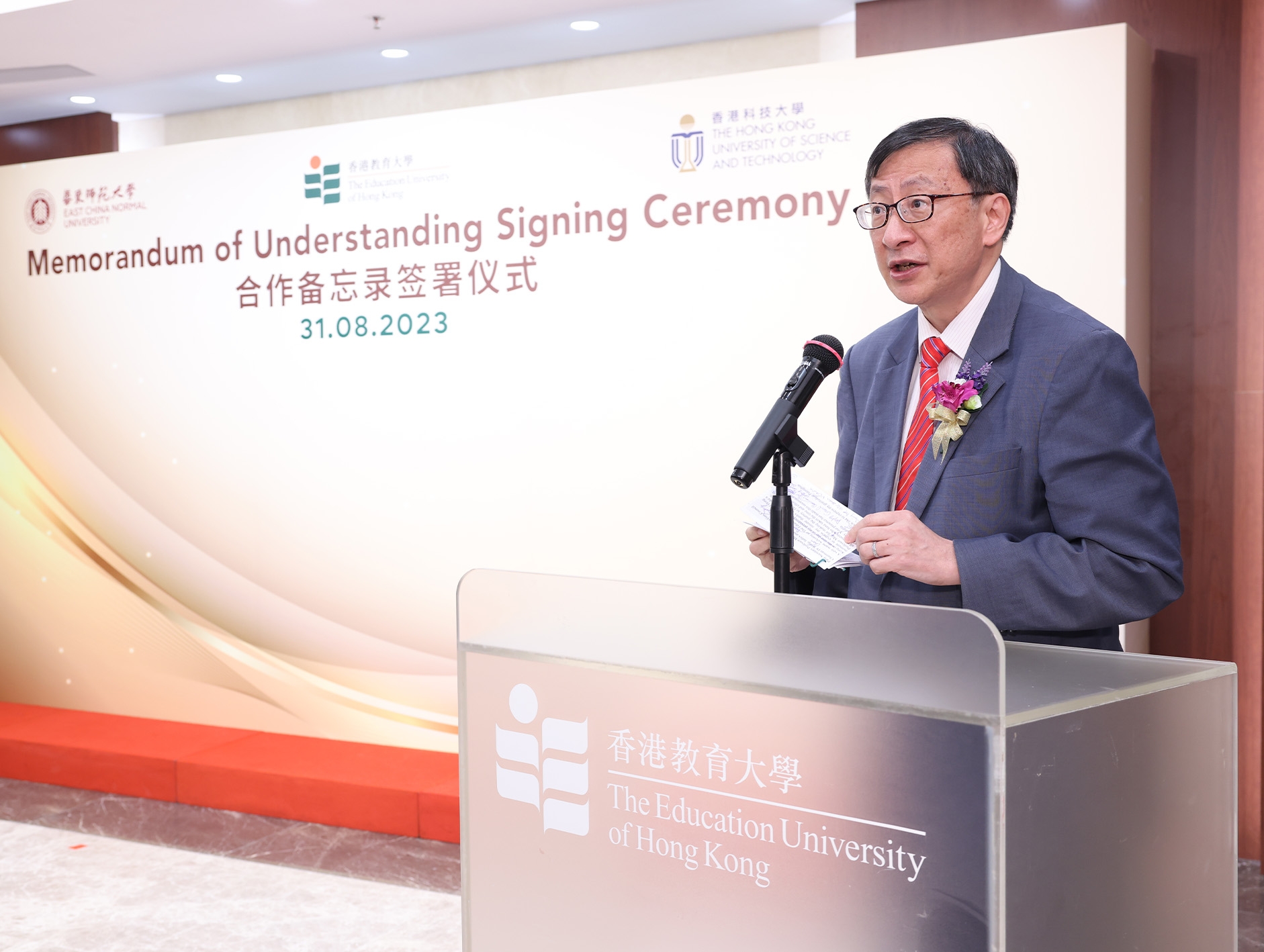Over recent years, the University has achieved remarkable growth in its research capacity and knowledge sharing and transfer efforts. We will continue to push forward the frontiers of research in education to develop solutions to pressing problems in the domains of policy and practice from various philosophical, economic and ethical perspectives. The interdisciplinary research themes include capacity building for the workforce, parental and community engagement, equity, ethics and social inclusion, and child/youth mental health and well-being.

While our commitment to excellence in educational research remains steadfast, we have expanded our research horizons to encompass the fields of AI and data science, environmental sciences, learning sciences, linguistics and language, psychology and social sciences. Looking ahead, the University will continue to push the boundaries of research and knowledge sharing and transfer beyond education by seeking breakthroughs in strategically identified fields and directions, such as emerging technologies, sports and health, and well-being, while leveraging internal and external partnerships to capitalise on available opportunities. Nine strategic research clusters have been established with the support of internal funds and research matching funds. Each research cluster is composed of multidisciplinary researchers and aims to address contemporary challenges faced by society. The current clusters cover the areas of data analytics in social science, educational technology, environmental toxicology, learning sciences, linguistics and language, longevity, SEN, social media, career and life development and lifelong learning. These research clusters solicit external research grants and form international research alliances to conduct large-scale, high-quality enquiries into related challenges and devise solutions. We will continue to identify and form new research clusters as a critical mass of faculty members converge around certain areas of research interest and societal need.
We plan to build new research infrastructure along the lines of the University’s existing research facilities in human behavioural neuroscience, data science and AI. Two new university-level research facilities, namely the University Research Facility of Data Science and Artificial Intelligence and the University Research Facility of Human Behavioural Neuroscience, have been established to offer faculty members and students state-of-the-art technological platforms to conduct high-quality research and to foster multidisciplinary collaboration and develop a cross-disciplinary research culture. The creation of physical or virtual research hubs will continue to stimulate innovation and collaborative research ideas among faculty members. Our research capacity has further been strengthened by our recent deep research collaborations with The Hong Kong Polytechnic University and The Hong Kong University of Science and Technology locally and with East China Normal University and Peking University nationally. We will actively seek research collaborative partners in Mainland China, Asia, the European Union and North America. These collaborations will enable our faculty members to embark on international research agenda and pursue international grants.

From 2022 to 2024, our researchers succeeded in obtaining more than HK$50 million in external research and development funds (e.g. from the Quality Education Fund e-Learning Ancillary Facilities Programme and The Sports Science and Research Funding Scheme) for projects involving AI, robotics, eye-tracking, body-movement and video technology between 2022 and 2024. The University will continue to expand its talent pool in science and technology and will establish joint research centres and laboratories in the areas of AI, data science, computer science and environmental science. Besides securing more research and development grants from external agencies such as the Innovation and Technology Commission, we will seek to attract venture capital, donations and sponsorships from commercial sectors. Our goal is to increase the financial sustainability of more start-up companies to enhance their capacity to produce meaningful social impacts. Our knowledge transfer endeavours will be fuelled by locating EdUHK-nurtured start-up companies in the new Centre for Entrepreneurship and Research at the Hong Kong Science and Technology Park (HKSTP). These companies, together with the students’ internship scheme, can benefit from the incubation programme and venture capital events offered by the HKSTP. Through these endeavours the University will generate tangible benefits for not only the local community but also the nation and the world at large.
Our strategy is to establish a nurturing environment for faculty members to conduct impactful research which addresses societal and national needs. At the international level, the University’s research impact will contribute to enhancing its academic reputation and research capacity, as reflected in higher QS subject rankings for Education and Training, English Language and Literature, Linguistics, Psychology and other disciplines.

Fostering Entrepreneurship and a Research-based Learning Environment
To cultivate innovation and entrepreneurialism among our students, the University will foster a research-based learning environment and create more opportunities for the students to take part in research and knowledge transfer activities. The University has implemented an undergraduate research-based learning scheme for undergraduate programmes, in which students can engage in action research supervised by faculty members, learning negotiation and the implementation of solutions to address real-world problems within various professions, disciplines and the broader community. Furthermore, we will continue implementing the Innovation and Entrepreneurship Student Talent Development (INVESTED) programme, which offers entrepreneurship training, international competition and start-up experience/internship to undergraduate and postgraduate students.
Research-based learning will be introduced in the Master of Education programme hosted by the Graduate School. Interested students will be able to join the research and entrepreneurship enrichment scheme offered by the University’s research centres and facilities. The enrichment scheme will be opened to all students in TPg programmes over the next few years. Short-term attachment programmes will be introduced to provide students at all levels with learning opportunities at the University’s research centres and facilities.
The University has achieved a modest growth in the number of doctoral students and the scale of doctoral research student training over the past few years. The Graduate School has a proactive plan to further enhance the comprehensiveness and quality of its research training. We plan to expand the number of doctoral students by 50% in the next three years by introducing a three-level studentship quota system and a self-financed mode. The Graduate School will work with the three faculties and their departments to develop and strengthen the specialised and advanced courses offered. Training will be provided to new supervisors and students on ways to promote the quality, productivity and impact of their research work. The RPg training programme will be expanded to include more joint supervision, laboratory attachments and entrepreneurship involving other local and overseas universities and research institutes. Our target is for our doctoral students to become a major research force in the university and society at large.
Establishing an Ecosystem for Research and Knowledge Transfer
The University will adopt a proactive approach to expand and diversify research funding sources from different sectors to support research and knowledge transfer initiatives. We will also invest more in training and support to encourage faculty members to apply for various research funds. We will leverage large donation grants and industrial sponsorship to embed high-quality research components. These constitute the foundation for impactful research and the enhanced academic reputation of the University. The University has actively engaged in international and regional collaborations. For example, the Tripartite Alliance to Champion AI and Education Futures was established between EdUHK, The Hong Kong University of Science and Technology and East China Normal University to harness the institutions’ individual strengths in a collective endeavour to address the evolving educational needs of the GBA and the country. We have also established a joint research programme with the United Arab Emirates University in the areas of early childhood education, environmental sustainability, and happiness and well-being. By pooling resources and expertise, partnerships can amplify our collective impact, addressing global challenges and ensuring sustained progress in research excellence and societal well-being. Such collaborations also further enrich the academic experiences of our students and contribute to advancing knowledge transfer and innovation.

Augmenting Interdisciplinary and Transdisciplinary Collaborations Beyond Hong Kong SAR
The University is dedicated to utilising all resources and opportunities to strengthen and extend its research and knowledge transfer initiatives in Hong Kong SAR and beyond. The establishment of the two new academies exemplifies our dedication to creating a higher level of synergy across faculties and other internal units and to fostering more interdisciplinary and transdisciplinary collaborations with external organisations and institutions. The Academy for Educational Development and Innovation serves as the hub of educational development and innovation in the GBA and beyond, and the Academy for Applied Policy Studies and Education Futures as the hub of educational technology, national security and legal education, innovation and entrepreneurship in the context of Education Futures.




